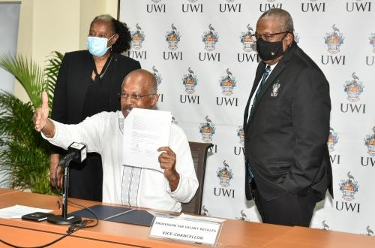Nadine Wilson Harris
The University of the West Indies (UWI) had to set aside a meeting that was scheduled earlier this week to accelerate plans to implement a controversial gender policy following strong pushback.
The Freedom Come Rain newspaper was reliably informed that the policy has caused discomfort for many at the regional institution. The gender policy is aimed at promoting gender diversity and the inclusivity of LGBTQI agenda at the university, but there are fears that those who fail to comply will be sanctioned.
The policy, which was first drafted in 2017 by a gender policy steering committee, was revised and updated in 2022 and will be implemented across all five UWI campuses. It is expected to be adopted by students, faculty members and even those contracted by the institution.
The regional university which has been ranked among the top 1.5 per cent universities globally, will be the first tertiary institution in the Caribbean to implement such a policy, which it said will reflect its core values as reiterated in its 2022-2027 Strategic Plan. These values include gender justice and diversity.
“The UWI Gender Policy is a framework to guide the creation of a supportive environment for all persons, inclusive of gender identities and sexual orientations, in all aspects of university life,” the university stated in a section of the policy which has been seen by the Freedom Come Rain newspaper.

“Congruent with The UWI’s roots and re-emergence as an activist university with an anti-imperial agenda, the institution’s Gender Policy secures its location on the vanguard of engaging in advocacy and producing transformative policy for social change,” it said.
But there are concerns that those with conservative views on gender and sexuality will be forced to confirm or face disciplinary action. A large section of the Jamaican population for example, identify as Christians and are of the view that homosexuality is against God’s design for humankind. Buggery is also still illegal in Jamaica.
The UWI has made it clear however that it intends to “identify and address systemic biases and all forms of discrimination that exist in its organisational culture that do not promote, support or enable social justice.”
The university, which up to 2021 had more than 19,000 students enrolled, said it intends to promote the institution as a learning environment which is free from sexism, misogyny, homophobia, transphobia, xenophobia, among other things which it said has been used as the basis for oppression.
“All staff, students and other stakeholders within the University, and all associated with the University, have a responsibility to adhere to the Gender Policy and to apply its tenets in their day-to-day activities and all dealings with or on behalf of the institution,” the policy stated.
The tone of the policy suggests there will be no room for dissent, not even on the grounds of freedom of thought, conscience, belief or religion. In fact, there will be a “zero tolerance” for gender injustice. According to the document, the Vice-Chancellor will ensure that the appropriate protocols and guidelines are in place to guarantee that action is taken against staff or students who breach or violate the policy. The Vice-Chancellor will rely on the Pro Vice-Chancellors and other members of the senior management of the University to reinforce the tenets of the Gender Policy and facilitate its full operationalisation.
The university said its gender policy will ensure that the institution is operating within best practices for tertiary institutions and will ensure that it is compliant with international, regional and national protocols including those established to promote gender justice, which CARICOM countries have ratified. It provided a list of protocols, which includes, The UN Declaration on Human Rights (1948), UN Convention on the Elimination of all Forms for Discrimination Against Women (1979) and the Jamaica Vision 2030 and National Policy for Gender Equality (2011)






